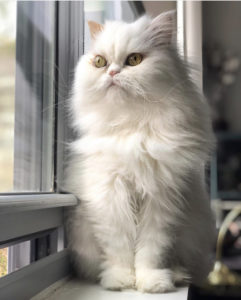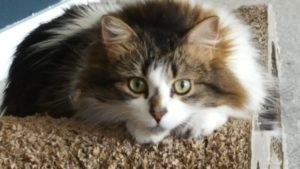Could My Cat Have A Food Sensitivity?

Benson
Photo credit: @the_bensters
One of the most common issues I see in cat clients is food sensitivity. Not to be confused with food allergies, food sensitivities manifest themselves differently. In fact, there are a number of things to look for if you suspect your cat may have a food sensitivity.
Food sensitivity or food allergy?
First of all, food sensitivity exhibits different symptoms than a food allergy. When you cat has an allergic response to something the immune system goes into hyperdrive. Facial swelling, throat closing up, inability to swallow, anaphylactic shock, redness of the skin…all of these can be an immune response.
A sensitivity will present with symptoms not involving the immune system. Here are some of the most common examples I see most often:
- Regurgitating food right after eating
- Vomiting digested/partially digested food, hours after eating
- Loose stools or diarrhea
- Itchy skin or constant scratching
- Bald spots, hair loss
- Finicky eating–one day they like the food, the next day it goes untouched

Sasha
Does food quality affect sensitivities?
One client in particular has a cat, Sasha, who has had loose stools ever since she was a kitten. Despite numerous vet check ups for parasites and blood work, the vet was unable to determine the cause of Sasha’s condition. Thinking the condition would improve if she changed the brand of food, choosing a better “quality” product, my client began trying an assortment of wet and dry foods. Unfortunately, no matter how good the ingredients appeared, the condition remained unchanged.
It wasn’t until I used muscle testing that the secret was revealed. Food sensitivity resonated strongly for three proteins! In addition, lots of non-protein foods also resonated, including corn, wheat, soy, legumes, food additives, food dyes, and sugar. When I followed up with the client we discussed my findings, and then it dawned on her: the same underlying proteins were in all the different foods, no matter which quality of food it was.
How to be a good detective when it comes to food sensitivity
My approach to identify stressors in a cat’s body is to muscle test. This allows me to tap into the cat’s energy to see what resonates. If you are unfamiliar with how muscle testing works or unable to do it yourself, here are several tips you can use to rule out a food sensitivity in your cat.
- Start with a limited ingredient diet. Choose a food that only has one animal protein in it.
- Eliminate chicken and fish. These are very common culprits with food sensitivities.
- Stop feeding dry food. The high percentage of carbohydrates often causes issues.
- Eliminate all peas and legumes from wet and/or dry food.
- Keep a record of the symptoms and how they correspond to the food you feed daily/weekly.
After making the change, notice if you see a difference in your cat’s symptoms. Using the “elimination” strategy can often narrow down or even pinpoint exactly what your cat is sensitive to.
Final thoughts
My best advice is to always make it your goal to address the underlying cause. Because there are so many ways to “treat” the numerous symptoms above, you could easily spend hundreds of dollars putting “bandaids” on them. Often times these efforts are unsuccessful simply because the root cause has never been addressed. Veterinarians may recommend blood work, expensive tests and diagnostics, too; however, not all these may be necessary. Start simple! Because nutrition is so fundamental to cats’ health, it’s an ideal place to start.
To learn more about food allergies and sensitivities, check out this great article by Dr. Karen Becker.

